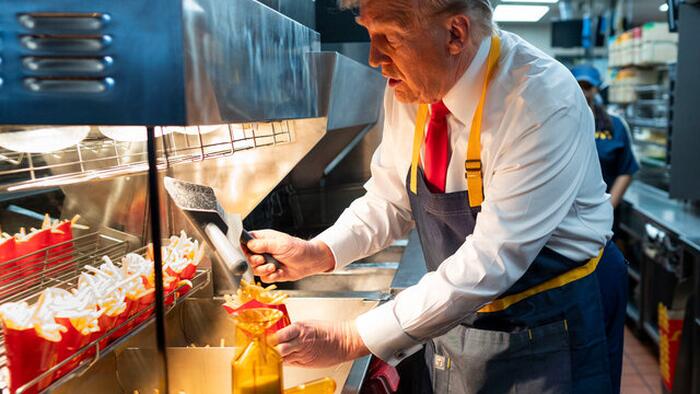In a striking series of events following a public appearance by former President Donald Trump at a McDonald’s, the CDC announced a deadly E. coli outbreak linked to the fast-food chain’s Quarter Pounder hamburgers. Shortly after Trump staged a photo-op at the restaurant, cooking fries and interacting with customers, the CDC revealed that the outbreak had resulted in one death and ten hospitalizations across ten states, with Colorado and Nebraska being the most affected areas. The agency expressed urgency in its investigation, highlighting a total of 49 reported cases of E. coli infection related to the burgers. Health officials urged anyone experiencing severe symptoms after consuming the Quarter Pounders to seek medical assistance, immediately raising concerns over food safety at a prominent chain.
The situation was exacerbated by McDonald’s decision to pull certain ingredients from its menu, specifically fresh slivered onions and quarter-pound beef patties, in light of the outbreak. The rapid response reflected the fast-moving nature of foodborne illness investigations. Following the CDC’s announcement, McDonald’s stock plummeted by 10% in after-hours trading, stirring speculation about the implications of the outbreak on the company’s reputation and financial standing. This incident coincided with a politically charged atmosphere, as the discussions surrounding Trump’s candidacy and the broader implications of food safety drew numerous reactions across various media platforms.
Notably, McDonald’s addressed the backlash from the public and political commentators, noting that Trump’s visit was handled through the local franchise operator. The company clarified its nonpartisan stance in politics, reiterating that it does not endorse candidates during elections. The statement emphasized that the McDonald’s brand is known for engaging all kinds of customers, reflecting its commitment to inclusivity. The juxtaposition of an emerging public health crisis with a high-profile political event highlighted growing concerns over the intersection of politics and public health amid an election cycle.
The media portrayal of Trump’s visit to McDonald’s also garnered attention, particularly from outlets like The New York Times, which focused on customer experiences during the event. This coverage included light-hearted moments, such as Trump joking about adding more salt to the fries, showcasing the surreal blend of politics, media, and fast food culture. However, this behavior, combined with the serious implications of the E. coli outbreak, presented a stark contrast that the public and media found both intriguing and troubling.
As speculation surrounding the outbreak and its implications grew, onlookers noted the potential for political maneuvering in response to the incident. Trump, already facing legal challenges, could find this outbreak as fodder for his opposition. The juxtaposition of lighthearted political stunts and grave public health concerns engendered a sense of irony, suggesting that the political landscape may manipulate even crises such as food safety emergencies. This dynamic raised questions about transparency, accountability, and the broader implications for public perception of both Trump and McDonald’s.
Amid these developments, the potential for further investigations, both governmental and legal, loomed. With ongoing scrutiny of food safety practices and the intertwining of fast food with political narratives, the future of these entities may hinge on how public perceptions evolve in the wake of the E. coli outbreak. This incident serves as a reminder of the far-reaching effects of seemingly benign events, like a presidential campaign stop at a fast-food restaurant, and how they can resonate through political, social, and public health domains, compelling stakeholders to reconsider their responses in an ever-evolving landscape.

